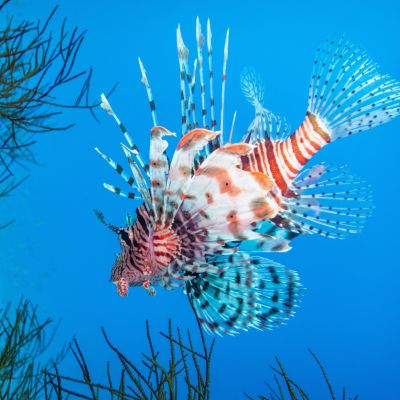
Lionfish: they're like the flamboyant, overconfident party crashers of the ocean, decked out in vibrant stripes and sporting a crown of venomous spines. Native to the Indo-Pacific, these attention-grabbing fish have somehow managed to infiltrate the Atlantic, wreaking havoc on the delicate ecosystem and leaving native fish wondering, "Who invited these guys?"
At Dive Right In Scuba, we're all about appreciating the wonders of the underwater world, but even we have to admit: lionfish are causing a major headache for our fishy friends. So let's take a closer look at these invaders, explore their impact, and discover what's being done to combat this not-so-fairy tale of the sea.
The Lionfish Lowdown: A Closer Look at these Show-Offs
Lionfish are native to the warm waters of the Indian and Pacific Oceans, where they're part of a balanced ecosystem. But in the Atlantic, they're like a bull in a china shop, disrupting the delicate balance and causing a whole lot of trouble.
So how did they get here? The most likely culprit is the aquarium trade. It's believed that some irresponsible aquarium owners released their unwanted lionfish into the Atlantic, where they've thrived in the absence of natural predators.
With their striking appearance and venomous spines, lionfish are hard to miss. Their vibrant red, brown, and white stripes serve as a warning to potential predators, but in the Atlantic, most fish haven't gotten the memo.
The Lionfish Invasion: A Real-Life Horror Movie for Native Fish
Lionfish are voracious predators, and their insatiable appetite has had a devastating impact on native fish populations. According to a study published in the journal PLOS ONE, a single lionfish can reduce the juvenile fish population on a reef by up to 79% in just five weeks! This rapid depletion of prey species can have cascading effects on the entire ecosystem.
And if their predatory prowess wasn't enough, lionfish also reproduce like, well, fish. They can spawn every few days, releasing tens of thousands of eggs into the water. With no natural predators to keep their numbers in check, their populations have exploded, creating a serious ecological imbalance.
The impact of the lionfish invasion extends beyond just fish populations. By decimating herbivorous fish, lionfish indirectly contribute to the overgrowth of algae, which can smother coral reefs and disrupt the entire ecosystem. It's a domino effect of destruction, and it's threatening the health of our oceans.
The Fightback: What's Being Done About the Lionfish Invasion
Thankfully, scientists, conservationists, and divers are fighting back against the lionfish invasion. Here are a few of the strategies being employed:
- Removal Efforts: The most direct approach is to remove lionfish from the reefs. Organized culling programs, lionfish derbies, and even recreational divers armed with spears and containment units are all contributing to the effort to reduce lionfish populations.
- Creative Solutions: Scientists and engineers are developing innovative solutions to the problem. This includes lionfish-specific traps that lure them in with bait and even exploring the possibility of training sharks and other predators to recognize lionfish as prey.
- Culinary Delights: Did you know lionfish are actually quite tasty? By promoting lionfish as a sustainable seafood option, we can create a market for their removal and help control their populations.
Are We Actually Winning the Battle?
While these efforts are making a difference, the lionfish invasion is far from over. The challenges are numerous:
- Rapid Reproduction: Lionfish reproduce at an alarming rate, making it difficult to keep their populations in check.
- Deep Reef Access: Lionfish can be found at depths beyond the reach of recreational divers, making removal efforts in those areas more challenging.
- Limited Resources: Conservation efforts are often hampered by limited funding and resources.
Despite these challenges, ongoing research and innovative solutions offer hope for the future. Scientists are exploring biological controls, such as introducing natural predators or diseases that specifically target lionfish.
Let's Keep Our Reefs Lionfish-Free
The lionfish invasion is a stark reminder of the delicate balance of our oceans and the unintended consequences of human actions. But it's also a testament to the resilience of the natural world and the power of collective action.
At Dive Right In Scuba, we believe that every diver has a role to play in protecting our oceans. By choosing responsible dive operators, participating in lionfish removal efforts, and spreading awareness about this issue, we can all contribute to a healthier and more balanced marine ecosystem.
So, the next time you're diving in the Atlantic, keep an eye out for those flamboyant finned invaders. And remember, if you see a lionfish, report it to your dive operator or local authorities. Together, we can help keep our reefs lionfish-free and ensure a vibrant future for our oceans.
